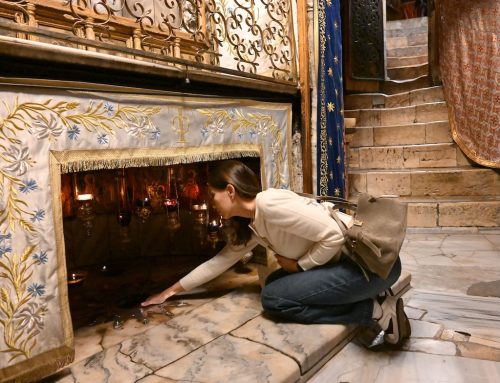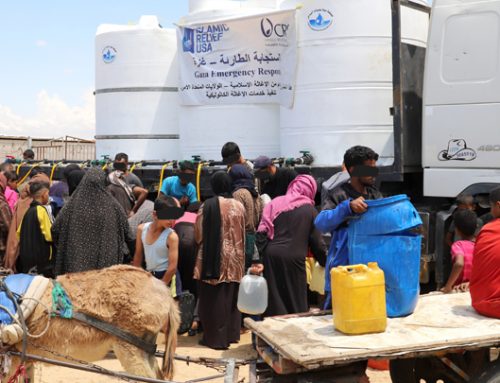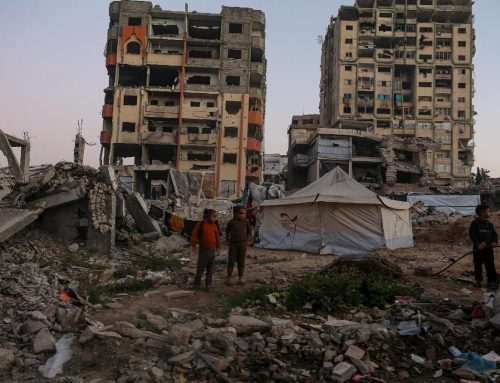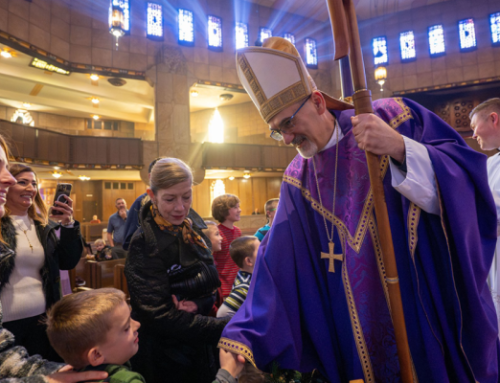Excellencies, Dear friends,
We are grateful for the Holy Land Christian Ecumenical Foundation that organized this reception, and to those who accepted the invitation to be with us. The word that is the most used in the Holy Land, Israel, and the Arab countries is Peace, Salaam, Shalom.
The Current Reality
Here we are in a Holy, ancient, and historic land for the followers of the world’s three great monotheistic faiths. As Christians, it is a powerful and moving experience to be where Jesus was born and grew to manhood, where He lived and taught. We stand just steps away from the site of his crucifixion and burial, and from where He rose from the dead. But, it is also heart wrenching and painful, because we are in the midst of an ongoing modern geopolitical conflict in this very same land.
The buzz words of this Holy Land are familiar to all of us: occupation, terrorism, settlements, rocket attacks, home demolitions, and security.
All are powerful, resonant, hotly debated, and politically charged. But beyond the peace efforts, the statistics, and the buzz words, are the people of the Holy Land. Two national narratives, three great religions! For too long, the people of this land have been mired in conflict. Many innocent have suffered and many continue to suffer.
Sadly, the conflict seems more entrenched than ever, and more complicated. Most of the trend lines are in the wrong direction.
• More than 400,000 Israelis now live in Palestinian occupied territories
• The demography of Jerusalem is changing rapidly and a careful balance of sacred space is being threatened.
• And let us never forget the human tragedy taking place in Gaza
Perhaps the most complicated and troubling of all is the fact that hope is being shattered. As the Psalmist tells us, where there is no hope, the people perish. An entire generation of Israelis and Palestinians was born and raised witnessing and experiencing constant violence, occupation, separation, and hatred. With fewer opportunities to interact, and with heightened suspicion and apprehension on both sides, it becomes:
• More and more difficult to envision a future of coexistence,
• Easier to demonize the other, and
• Harder to forgive, harder to start a dialogue.
Why has not this conflict been resolved yet? There are many reasons, and the past is replete with missed opportunities and a lack of good political will. And, of course, much of the blame must rest with the internal leadership and authorities. Yet, dear friends, you are external influential forces who bear responsibility as well.
Ultimately, the Israelis and Palestinians who live in the Holy Land must work out their differences in a just manner, and in ways that will require painful compromises. I would point out that both sides must abandon maximalist claims to a life in the land without the other, and reconciling themselves to the belief, that we live in a world where proximate justice is the best we can hope for and to not leave the last word to extremists.
So, while we can agree that it is up to Israelis and Palestinians to find a solution, we must also realize that they are not able to do this without external interventions.
The international community has not simply a role to play, but a responsibility and self-interest, based on:
• The way in which this conflict is used and perpetuated by a variety of outside powers and interests
• The universal nature of Jerusalem, as a sacred city to billions of Jews, Christians, and Muslims from around the world
• The way in which conflict reverberates throughout the region and beyond
The Israeli-Palestinian conflict is rather unique in America. It is a foreign policy issue, with vital foreign policy and national security implications, but it functions more like a domestic political issue.
We understand that the only solution to the conflict is one that recognizes the inherent and fundamental dignity of all the people who live there – Israelis and Palestinians, ; Jews, Christians, and Muslims. We cannot have peace for one people without the other. The security of one must be, at the same time, the security of the others. Our aim is to help good-will Americans better understand that the only authentic pro-Israel position is one that is also pro-Palestine and pro-peace. This is the only authentically pro-American stance.
Two important issues are often absent from discussion of the Israeli-Palestinian conflict:
• The human face of the conflict, and
• The interest in resolving it for the American national security and the whole Middle East.
This is an important moment because:
• The possibilities for a just resolution are rapidly decreasing.,
• The forces of extremism are growing and gaining followers and supporters.,
• The Arab Peace initiative of March 2002 remains on the table, with recognition by many Arab governments that regional threats to their security come not only from Israel, but also from Iran.
• The U.S. Administration, the European Union, and the United Nations, are all in agreement about the urgency to bring about an end to the conflict.
• The Arab Spring of young generations in the region is coming sooner or later, and is coming with violence or peacefully-— no regime is immune from these events, not even Israel.
Dear Friends, what can we do?
1. Each of us can pray to our common God to ensure our common coexistence and our common peace in this common geographic space, in our common Holy Land, and our common Holy City of Jerusalem.
2. Connect, understand, and be in communion with the Christians who live there, share in their suffering and joys, bear their burdens, reflect and consider your responsibility towards your Mother Church.
Talk about your observations, what you have seen, the people you have met during your pilgrimages, and support the Christian institutions in the Holy Land; and upon your return, tell your story, your experience, your reactions, your admiration, and your surprises – good and bad.
3. Educate your communities
What do American Christians need to know about the conflict there?
• Their hopes and fears, and that their presence is threatened by virtual extinction.
• The land of Jesus cannot become an equivalent of a spiritual Disneyland, with beautiful buildings, historic sites, and museums.
• All people– Jews, Christians, and Muslims suffer– as a consequence of the conflict. Occupation is bad for the image of any democratic State, as it is bad for the people of the occupied areas, where hatred and aversion are fostered and nurtured.
• Majority of the people, both Israelis and Palestinians, long for peace and support a two- –state solution.
Encourage and persuade people to ‘come and see’ as there is no substitute for a real tangible experience. A pilgrimage is important, but what it is most important is that we encourage a pilgrimage where you can meet and break bread with the Living Stones. The Jews of this land have a narrative that is authentic and should be respected. But so do the Muslims, and of course, so do the Christians. There is an Israeli story that must be respected, and there is also a Palestinian story to be told and to be respected.
Let us remind people that every man, woman, and child who lives there today, is created in the image of God, is endowed with inherent dignity, and is worthy of respect. To ignore the dignity of the other, – whether the other be Christian, Muslim, or Jew, is to live in violation of God’s will for us.
Finally, I am proud to announce the good news that our new American University of Madaba will open its doors for the first time this October! I ask Dr. Saliba Sarsar to provide you with more details and a visual presentation.
Thank you again for your support and confidence as we go forward.





